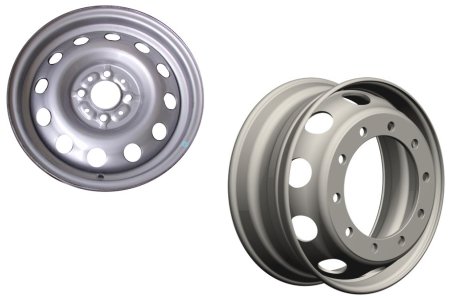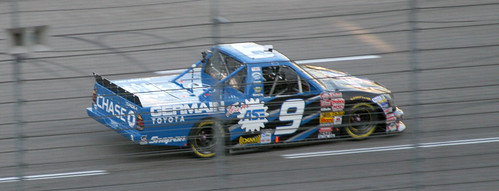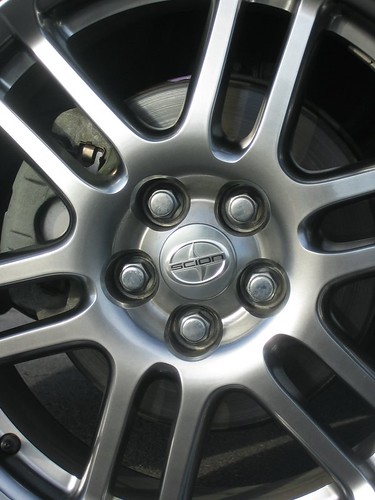After-Market Truck Wheels – Materials and Methods Explained
Mark | Jun 03, 2009 | Comments 6
When choosing a wheel for your truck, sometimes the number of different options can seem overwhelming. Not only are there many different designs and brands to choose from, but the way the wheels are manufactured, and the material used, are important as well. This article deals with common materials and manufacturing methods – we’ll have something on wheel finishes a little later.
Here’s a break-down of common wheel materials and manufacturing methods:

Steel wheels are great for trucks because they're cheap and strong.
Steel wheels are the most basic and inexpensive type of rims available. Steel wheels are usually stamped out by a press in two different pieces and then welded together. This makes them easy to repair, which isn’t usually a major concern because steel is a very strong material. Of course, steel is also very heavy. The large un-sprung weight of steel wheels can have a significant negative impact on suspension performance, not to mention acceleration and fuel mileage.

![]() photo credit: AlexDixon
photo credit: AlexDixon
A sharp Tundra rolling on blacked-out aluminum rims.
Aluminum might not be quite as strong as steel, but it is very, very close. It is also much lighter than steel, which gives it an advantage in performance-oriented applications. The most common cast wheel manufacturing method is to pour molten aluminum into a wheel mold and allow it to take shape as it cools down. Unfortunately, this process introduces several weaknesses into the wheel. Since the aluminum isn’t quite uniform in density when it cools, some of the crystals inside the aluminum alloy end up with large gaps in between them, which can cause the wheel to crack and break under stress. The solution? Cast aluminum wheel manufacturers often use more metal than necessary, which compensates for weaknesses caused by the casting process but also raises the overall weight of the wheel.

![]() photo credit: sidehike
photo credit: sidehike
Forged aluminum wheels are strong and light-weight, making them ideal for racing.
The compromise between strength and weight in an aluminum wheel is achieved through a process called forging. Forged wheels are formed from aluminum which has been heated up until it almost reaches its melting point. Pressure is applied to the aluminum while it is in the heated state in order to form it into the desired shaped. By combining heat and pressure forging is able to re-align the alloy at a molecular level, eliminating crystal gaps and creating a much stronger wheel than casting. Not only is a forged wheel stronger, but it is also lighter by virtue of the fact that less materials are required during its construction.
So which type of wheel makes sense for you?
Realistically, inexpensive steel wheels are just fine for 95% of truck owners. They’re very strong, and since trucks aren’t famous for a nice smooth ride or performance handling, the larger unsprung weight of the wheel isn’t a big deal. Steel is also the ideal material for off-road use since it can be repaired.
Cast aluminum is more expensive than steel, but it’s also lighter so handling and ride are improved, and the small weight savings also helps boost fuel economy (every little bit counts). Off-road, there’s a chance that a cast aluminum wheel will break under heavy use. Having said that, there are lots of people using cast-aluminum wheels on the trail…they just have to be more cautious. Finally, most people prefer the look of cast aluminum wheels over steel.

![]() photo credit: (UB) Sean R
photo credit: (UB) Sean R
Most people prefer the look of aluminum wheels.
Forged aluminum wheels are almost completely unnecessary on a pickup. Since forged wheels are incredibly strong and lightweight, they’re an excellent option for a wheel…but they’re very expensive. Forged wheels are too expensive for serious off-road use (at least for most people), and the handling benefits you get from a lightweight forged wheel will be hard to notice in a typical rough-and-tumble truck suspension. The best application for forged aluminum wheels is racing, so unless you’re chasing drag slips there are better places to spend your cash.
The Bottom Line: Trucks are supposed to be tough, which means steel wheels are ideal. Steel can handle serious off-road use, heavy payloads, and just about anything else you can make your truck do. However, for most truck owners, a nice looking set of cast aluminum wheels are a good alternative to steel. Cast aluminum wheels are strong enough for all normal use, and they’re better looking too. As for forged wheels, save it for racing applications where it’s low weight will bring the biggest dividends.
By the way, if you’re in the market for wheels, the Tire Rack is an excellent website.
Search terms people used to find this page:
- tundraheadquarters
Filed Under: Toyota Tundra Accessories


But which one will make me look sexier and decrease my BMI?
Jeremy the steel ones will do fine.
And a set of fuzzy dice in the mirror with some 70’s era curb feelers. Oh yea. Thats snexy with a slice of goober.
Jeremy – You need the wheels with the LEDs that are imbedded in the spokes…they make pictures and stuff. That’s the BMI reduction package! 🙂
I am going to need some big wheels to reduce as much BMI as I need.
2007 tuned Toyota